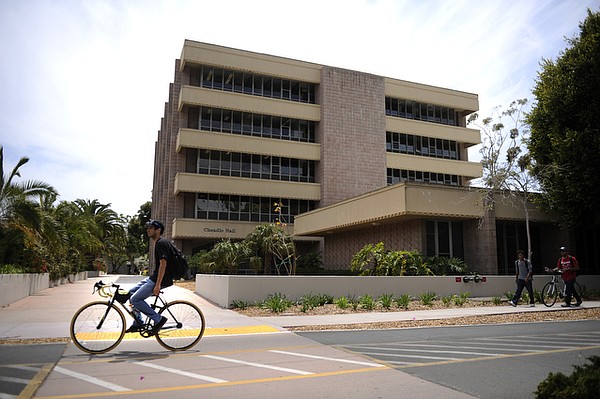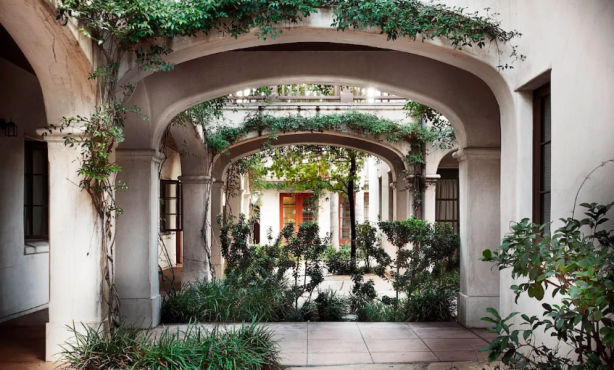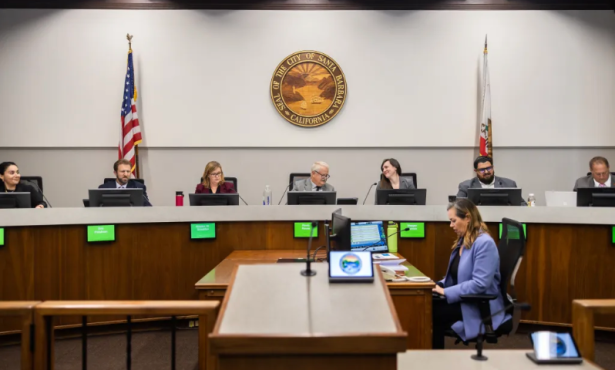UCSB Student Challenges Cheating Suspension in Court
Claims School Botched Its Judicial Affairs Process

A 19-year-old UCSB student was suspended for two quarters after she was accused of cheating on a calculus final last winter quarter. The third-year chemistry major has since taken her campus Judicial Affairs case to Santa Barbara County Superior Court, claiming the university denied her due process.
The student, who is identified only as Jane Doe in court filings, said soon after taking the final, Professor Samuel Ballas emailed her to say he had concerns about her test. When she met with him, she said, he presented her with three tests. She could see they looked similar. She told him she had no idea why, she said, and that she had never met the two women who sat next to her during the final. She had so far earned a C in the class, she said. Doe said her transcript now states “NG” for “No Grade.” (Doe’s attorney, Los Angeles-based Mark Hathaway, contended in court documents the pseudonym is necessary to preserve privacy in his client’s disciplinary and educational records. The university did not object to the “Jane Doe” designation. The Independent spoke to Doe on the condition of anonymity.)
The professor eventually referred the case to UCSB’s Office of Judicial Affairs, which facilitates the administrative process to discipline students on campus. On May 1, the day of the hearing, the three students accused of cheating were asked to sit in a row in the same order they had during the exam, Doe said. They each were allowed to make arguments before a panel. Doe claimed when she previously asked Judicial Affairs deputies if she should hire an attorney for the hearing, she was told it would send a signal of guilt.
UCSB spokesperson Andrea Estrada declined to comment on the pending litigation, citing university policy. According to the Student Conduct Code, students are permitted to bring an attorney or advisor to the hearing, but his or her role is limited to assistance and support. “Students are to represent themselves,” the code states.
Doe brought a copy of her midterm to demonstrate the markings on her final were consistent with her work on the previous test, she said, but the committee did not review it during the hearing.
In a letter dated May 22, Acting Vice Chancellor for Student Affairs Mary Jacob wrote Doe would be suspended for two quarters after the committee determined she violated campus policy. The letter alleged she “copied work from another student’s final examination or allowed your final examination work to be copied by another student.”
Doe disputed the decision in her own letter, arguing she had “been denied the right to defend [her] innocence.” She contended, among other things, that because all three students were brought together before the panel, it might have unfairly biased the committee to view the three as equal participants. She added she did not know the two other students, who admitted to being friends.
Further, she wrote, “All three tests were displayed for the panel’s review in a confusing, unfavorable, and poorly displayed manner.” Doe was the last to answer the committee’s questions, she argued, and her responses could have been “unfairly overshadowed by the previous two replies.” Does said she was unaware of the outcomes of the others students’ cases.
UCSB Chancellor Henry Yang denied Doe’s appeal. “Based on the information that you have included in your recent letter we find no additional basis for your appeal. Therefore, there is no change in the outcome of your sanction,” he wrote in a letter dated July 29.
Hathaway contended the school’s justification for suspension is solely based on “weird” stylistic similarities in some test answers. “The other strange result is that she’s been charged with either copying or allowing her test to be copied,” he said. “The school doesn’t know which it is.”
In court documents, attorney Jonathan Miller, who represents the university, denied all allegations and stated the school’s actions “were discretionary management decisions made in good faith and consistent with respondent’s policy and practice, thus precluding petitioner’s requested relief.”
Doe was prohibited from attending UCSB summer courses, but in response to her appeal, the university agreed to allow her to return to school during the fall quarter pending the court case’s resolution. This week, Hathaway said the university informed him that Doe must complete her suspension sentence next quarter and not return to class until spring. He hopes to return to court before Christmas to dispute that decision.
The case comes at a time when college Judicial Affairs departments across the country have come under increased scrutiny, particularly for their handling of sexual assault cases. According to Estrada, UCSB Judicial Affairs reviewed 123 cases last school year; 49 were for academic dishonesty; 15 were for sexual assault. Twenty-seven students were suspended, and one was expelled, she said.
In 2012-2013, there were 73 Judicial Affairs cases; 32 were for academic dishonesty; seven were for sexual assault; 34 were for “other” misconduct. UCSB does not track whether the cases designated “other” are criminal in nature, Estrada said. Since 2012, there have been 325 total cases, though some students had more than one case.
In the last five years, four UCSB Office of Judicial Affairs cases have been challenged in court.



